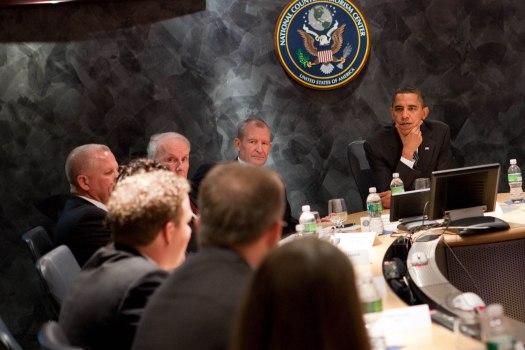
Why no Afghans at Obama’s meetings on Afghanistan?
Give the people of Afghanistan a few seats at the table where their future is being discussed.
Reading time: (Number of words: )
President Obama has been meeting with a lot of people about Afghanistan in recent days. As a man whose short political career has been spent primarily as a state senator in Illinois, he can’t be expected to understand much about the Afghan situation—about the economy of Daikondi, healthcare in Mazar-i-Sharif, differences between Pashtun and Hazara, the difficulties of raising a family in Kabul without electricity, plumbing, or an honest police force. How about imprisoned Afghan journalists, or Afghan refugee children beaten nearly to death by Greek police? President Obama is an intelligent, ethical, and driven man, and should be congratulated for taking the time to understand Afghanistan’s situation.
However, in none of his meetings has one single Afghan name appeared. A New York Times list of his various meeting attendees this week includes American government fixtures like John McCain, Joe Biden, Harry Reid, Nancy Pelosi, Carl Levin, David Obey, Nita Lowey, and Diane Feinstein. They are all elected U.S. Representatives. What is their experience or knowledge of Afghanistan? McCain has made a few brief visits to American military bases—which have no connection to the reality of Afghanistan. Generals Petraeus and McChrystal attended, and though they have spent years in Afghanistan, how many total hours have they
spent listening to the problems, needs and hopes of the Afghan people on the street— the ones joining the Taliban because they see only corruption, injustice, and little opportunity to advance after nearly nine years of Western aid and military occupation.
In Iraq, U.S. troops out on patrol are forbidden by superiors to buy even a Coke or falafel sandwich from Iraqi shops— so much for supporting the local population. Afghanistan shares this sad situation. Instead of absorbing and supporting the local culture many American personnel there huddle behind barricades and Hesco walls. They eat Taco Bell, Burger King, and KFC, and shop for flat-screen TVs, flip-flops, and Cocoa Puffs in huge barricaded shopping centers that are closed to locals. Occasionally, they convoy out of their compounds in gun-bristling SUVs and God protect anyone who dares get in their way.
Most Afghans are absolutely shocked to meet an American NOT dressed in military fatigues. And no wonder, since the U.S. State Department issues alarming warnings that all American civilians should stay out of Afghanistan. Most non-military American government employees live there in a state of perpetual lock down, desperate to get back home. Many never meet a single Afghan. From news reports, it is clear how certain American civilian security contractors spend their free time in Kabul.
So, who are these experts that surround President Obama? People from Iowa? New York State? Delaware? Where do they get their expertise? How many Afghans do they speak with every day? How many months has each spent in Afghanistan?
Are there no Afghan professors, community leaders, small business people, social service workers, attorneys, middle school principals, journalists, artists, pharmacists, nurses, or accountants who have worthy input about the country where they have spent decades? What about their concerns and fears for their livelihoods, families and friends?
What about refugees and political asylees? Shouldn’t the U.S. government need to understand the truths of why so many Afghans leave everything behind, risking horrendous journeys to flee their homeland? Why aren’t they in Obama’s meetings? Even just one?
Many voices are available and willing. What about Dr. Ramazan Bashardost, who has Afghan government experience and repeatedly demonstrated strong public support as a candidate in the recent presidential elections. How about Parwiz Khambaksh, the student-journalist who was jailed for nearly two years for discussing the Koran, and had to be smuggled out of the country to avoid a life sentence? What about Kamran Mir Hazar, founder of Kabulpress.org, who receives nearly 1,000 e-mails a day from Afghans openly speaking their minds about their country. How about Massood Qiam, formerly of Kabul’s Tolo-TV, and one of Afghanistan’s most respected journalists, who was hounded out of Afghanistan by government officials for telling the truth about corruption in his immensely popular TV news series. The list of possibilities is long.
If the U.S. wonders why the Taliban, despite its many horrific actions, is receiving growing support in Afghanistan it should consider that it might be asking the wrong people for advice. Instead of just Joe, Nancy, Stanley, David, Carl, and Diane, how about a few Mohammads, Bashirs, and Maryams thrown into the mix? Someone from Mazar or Bamian, and not just Minneapolis or Boise?
Without understanding the real motivations and problems of the people of Afghanistan, and gaining their support, every penny, and every life spent there, on all sides, will be a tragic waste. Obama should develop this understanding by giving the people of Afghanistan a few seats at his table too.

Poems for the Hazara
The Anthology of 125 Internationally Recognized Poets From 68 Countries Dedicated to the Hazara
Order Now









